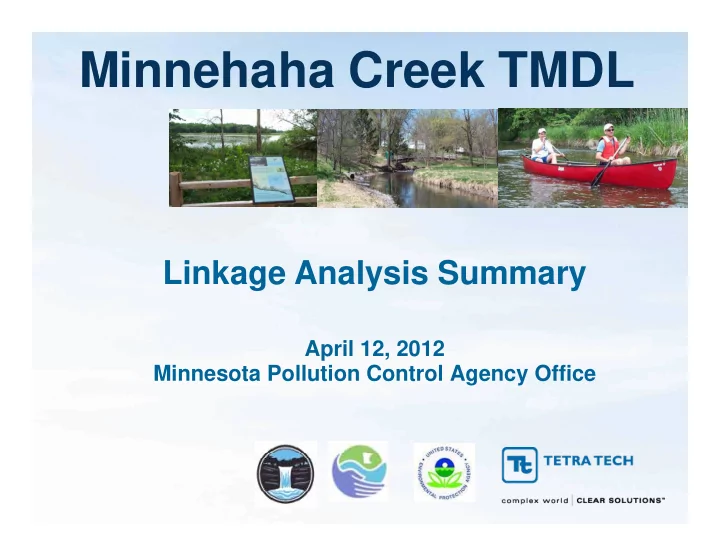

Minnehaha Creek TMDL Linkage Analysis Summary April 12, 2012 Minnesota Pollution Control Agency Office g y
Minnehaha Creek TMDL Approach Approach Watershed Characterization Work Plan Elements Work Plan Elements Implementation Plan Source Assessment Linkage Analysis TMDL TMDL
Minnehaha Creek TMDL Linkage Analysis Linkage Analysis Focus Focus Connect the pieces - Water quality - Hydrology Hydrology - Source loads Provide technical basis to define TMDL components
Linkage Analysis Discussion Overview Discussion Overview Data Driven Approach Target Development Target Development Flow Estimates Flow Estimates Watershed Loading g Allocation Options
Linkage Analysis Data Driven Approach Data Driven Approach Grays Grays Bay McGinty West 34 th Lake Hiawatha 32 nd Ave Excelsior Browndale Chicago Upton McGinty
Minnehaha Creek Longitudinal Profile Longitudinal Profile Bacteria Bacteria
Minnehaha Creek Longitudinal Profile Longitudinal Profile Total Phosphorus Total Phosphorus
Seasonal Average Patterns Seasonal Average Patterns Lake Hiawatha Chlorophyll-a (Response) Chlorophyll a (Response)
Seasonal Average Patterns Seasonal Average Patterns Lake Hiawatha Secchi Depth (Response) Secchi Depth (Response)
Seasonal Average Patterns Seasonal Average Patterns Lake Hiawatha Total Phosphorus (cause) Total Phosphorus (cause)
Minnehaha Creek Seasonal Variation Seasonal Variation Flow Flow
Linkage Analysis WHAT are the Targets WHAT are the Targets Minnehaha Creek GeoMean < 10% Parameter (#/100mL) (#/100mL) 126 126 1 260 1,260 E Coli E. Coli Lake Hiawatha Parameter Units TMDL Target 40 a / 50 b μ g/L Total Phosphorus μ g/L g/L Chlorophyll-a Chloroph ll a 14 14 Secchi Depth meters 1.4 a WQS Eutrophication Standard Notes: b MCWD Water Resources Mgmt Plan Goal MCWD Water Resources Mgmt. Plan Goal
Cause – Effect Relationships Effect Relationships Reduction Targets Cause Chlorophyll-a Chlorophyll a
Cause – Effect Relationships Effect Relationships Reduction Targets Cause Secchi Depth Secchi Depth
Reduction Targets Critical Conditions Critical Conditions Interannual Flow Variation Interannual Flow Variation
Cause – Effect Relationships Effect Relationships Reduction Targets Cause Chlorophyll-a Chlorophyll a
Cause – Effect Relationships Effect Relationships Reduction Targets Cause Secchi Depth Secchi Depth
Linkage Analysis Reduction Needs Reduction Needs 2001-2011 Parameter Target Reduction Average 301 1 E. coli (#/100mL) 126 58% 40 2 44% Total Phosphorus (µg/L) p (µg ) 70.9 50 3 3 29% 1 Average values reflect geometric mean, consistent with WQS. Notes: 2 Minnesota Rule 7050 2 Minnesota Rule 7050. 3 MCWD Lake Hiawatha water quality goal.
Linkage Analysis Flow Estimates Flow Estimates Needed for Load Calculations Needed for Load Calculations Load = Flow x Concentration x Conversion Factor Utilize WOMP Gage Consistent record Consistent record Key Considerations Grays Bay releases Storm water
Hydrograph Separation Hydrograph Separation Flow Estimates Base Flow / Stormwater Base Flow / Stormwater
TMDL Development Regulatory Regulatory Framework Framework TMDL Report -- Required Elements TMDL Report Required Elements Applicable WQ Standards Loading Capacity Source Assessment Allocations Seasonal Variation Seasonal Variation Margin of Safety TMDL TMDL = WLA Point Sources + WLA MS4 + LA + MOS WLA W A A MOS
Linkage Analysis Watershed Loading & Response Watershed Loading & Response
Linkage Analysis Assessment Points Assessment Points Grays Grays Bay McGinty West 34 th Lake Hiawatha 32 nd Ave Excelsior Browndale Chicago Upton McGinty
Allocation Options Equal Percent Reduction Equal Percent Reduction
Allocation Options Area Export Coefficient Area Export Coefficient
Allocation Options “Combination” Approach “Combination” Approach
Minnehaha Creek TMDL Discussion Discussion Data Summary Data Summary Phosphorus reductions needed Disproportionate areas of loading Bacteria reductions approximate Allocations Other options ??? Baseline year for MS4 permit Baseline year for MS4 permit
Recommend
More recommend